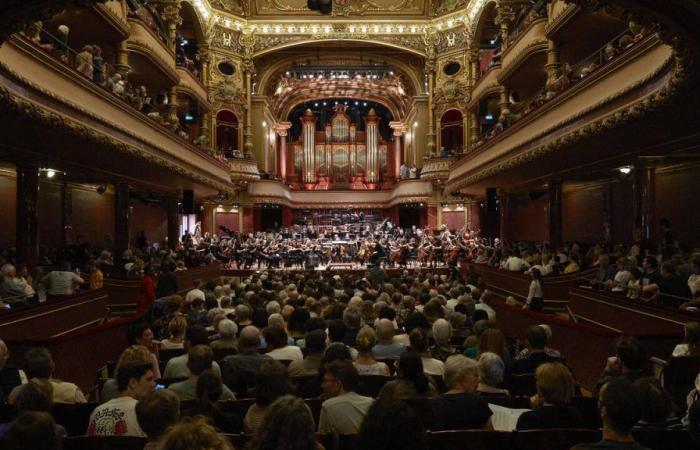Frédéric Steinbrüchel: In addition to the complications linked to travel to reach concert venues, visual impairment affects the appreciation of the atmosphere and context in which musical events can take place. Aside from concerts, practicing music and playing an instrument also proves complex for blind or visually impaired people. As a musical cultural actor, it seems essential to us to make the general public aware of these issues and attentive to the societal issues linked to them.
Steve Roger: While a blind or visually impaired person can obviously enjoy music, getting to the concert is the first hurdle we need to think about. Once there, one must also consider the fact that the experience of a musical event begins with the appreciation of the environment, which, at the Victoria Hall for example, turns out to be magnificent. It is then a question of also being able to appreciate the action specific to the concert and to access the information relating to it.
What policy do you deploy regarding the accessibility of your cultural offering to people with disabilities?
Steve Roger: Our policy is intended to be inclusive – we do our best to allow everyone to access our events. For people with reduced mobility, we have opted for our offer to be free, by providing a number of places dedicated to them in the concert halls. A policy that we have also adopted for people with visual disabilities on predefined concerts. In addition to these elements deployed with the aim of facilitating access to our cultural events, we are also carrying out various exploratory projects aimed at enriching and improving the concert experience itself. Last season, for example, we produced various podcasts aimed at blind or visually impaired people in order to make their experience more immersive, in particular by describing the Victoria Hall site and its specific features. A composer also participated in these recordings to share elements related to his piece.
Frédéric Steinbrüchel: Our positioning also consists of opening our cultural offering to the broadest possible societal spectrum. Unable to attend must of course be able to access our program, hence all of our events are free for them. We have also established a partnership with the ABA since 2020. In addition to integrating people with disabilities during our events, we have also set up a program of music lessons and practical workshops intended for visually impaired people. . For a year, musicians from the OCG went to the ABA premises to give specific percussion lessons. Participants in these workshops then performed at our traditional Christmas concert held at the Victoria Hall.
What feedback has been obtained following this type of approach?
Steve Roger: The feedback is encouraging, and we take particular care to be able to collect it directly from the audiences targeted by these projects. At the end of the piece enriched with the podcast, we organized a meeting with the project participants, the musicians and the composer. This feedback is essential to allow us to continue to improve in the deployment of these initiatives.
Frédéric Steinbrüchel: The experience proved to be very appreciated, particularly the practical and participatory dimension of the approach. The fact of being able to integrate the course participants into a performance was rewarding and was also very appreciated by the general public.
What are the current and future projects you are working on?
Frédéric Steinbrüchel: Among the projects we are currently carrying out, we are involved in making the theme of disability present in our programming. For this, we have planned a concert on November 4 to celebrate the 100th anniversary of the death of composer Gabriel Fauré, himself suffering from deafness at the end of his career. This event, which will be held at the Bâtiment des Forces Motrices, will be offered in a special lighting atmosphere, notably by lowering the brightness and offering the public the possibility of wearing a mask over their eyes. The objective is to offer an awareness-raising and empathetic experience while transmitting a positive message, namely the fact that visual disability can also promote the stimulation and development of other senses, including hearing acuity.
We are involved in making the theme of disability present in our programming
Steve Roger: We continue to explore the avenue of podcasts, by developing content broadcast using bone conduction headphones. The sound is thus propagated to the inner ear without interfering with listening to the concert in progress. In terms of programming, the Aranjuez Concerto for guitar and orchestra which we welcome on November 6 at the Victoria Hall and November 7 at the Théâtre de Beaulieu in Lausanne was written by the composer Joaquín Rodrigo, who was himself blind. A strong message which demonstrates, whatever one’s disability, the possibility of fulfilling oneself and achieving great things.
Missions dedicated to visually impaired people
by the Pro Visu Foundation and the ABA
In Switzerland, around 377,000 people are blind, visually impaired or deafblind*. With 310 vision disorders and diseases recorded**, the diversity of situations is wide, potentially affecting all age groups and seriously affecting the simplest everyday actions.
The Pro Visu Foundation was born 25 years ago from this desire to prevent eye diseases. It supports both scientific research and projects and institutions helping people with visual disabilities.
As for the Association for the Good of the Blind and Visually Impaired (ABA), a private non-profit organization founded in 1901, it carries out a mission complementary to that of Pro Visu. Its activities and services aim to improve the quality of life, integration and autonomy of people with visual disabilities in Geneva. Thus, the ABA’s multidisciplinary teams support and advise the people concerned and their loved ones through occupational therapy and social assistance services to facilitate their daily life, their inclusion and defend their rights. They also work to promote access to literature and school and institutional documents by adapting works into audio and Braille. In addition, ABA accessibility experts provide consulting services to communities and institutions to make the built environment and visual environment accessible. They also train health professionals working in particular in EMS and sheltered workshops.
To complete its field of action and participate in the events marking the anniversary of the Pro Visu Foundation, the ABA will have the pleasure of being present next November at the concert In the dark of the OCG as well as the Aranjuez Concerto for guitar and orchestra of the OSR to raise awareness among the general public of the problem of visual impairment.
Learn more about ABA: https://abage.ch
Find out more about the Pro Visu foundation: https://www.provisu.ch/
*Magazine “Tacteur” 2020, “Evolution of disability in Switzerland”
**Institutional website of the Pro Visu foundation






